Almar Kenya offers dry (conventional) and refrigerated shipping container rental which can be beneficial for a variety of reasons as per below:
Shipping container rental is often a more cost-effective solution compared to buying them, especially if you only require them for a limited period of time. Renting a container eliminates the need for a larger upfront investment and allows you to allocate your funds to other essential financial outlays of your business or project.
Container rental provides flexibility in terms of the number of containers you require and how long you need them for. You can rent containers for as long as you need them – weeks, months, or even years. You can also adjust the number of containers rented based on your changing needs. This adaptability is particularly valuable for temporary projects, during construction, and events for businesses with fluctuating demands.
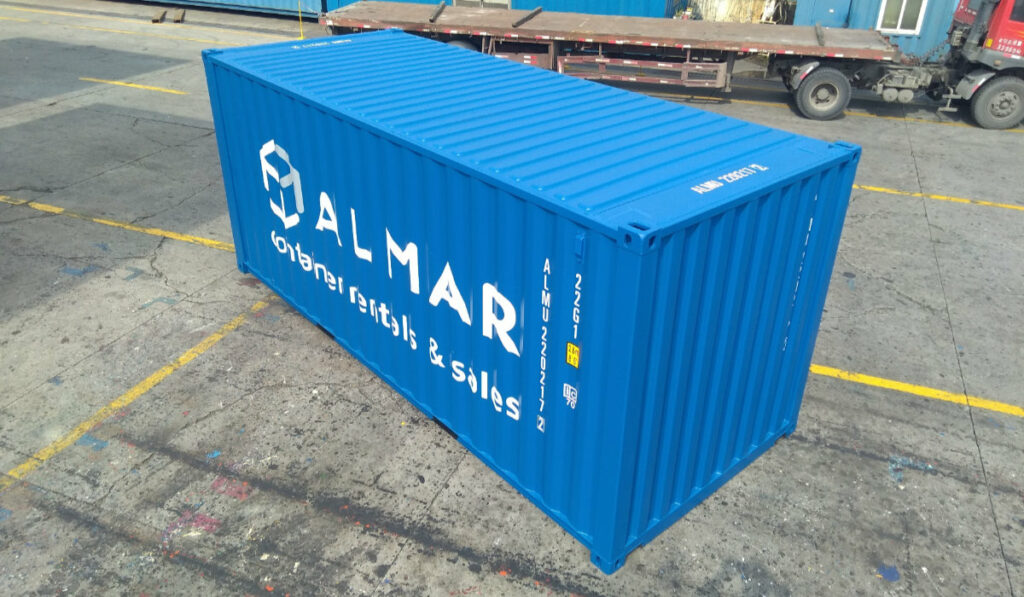
Containers are portable and can be delivered to your desired location. Conventional containers also known as dry shipping containers are ready to use upon arrival, requiring minimal setup time and effort. This is particularly advantageous for on-site offices, storage facilities, or temporary accommodation where time is of the essence.
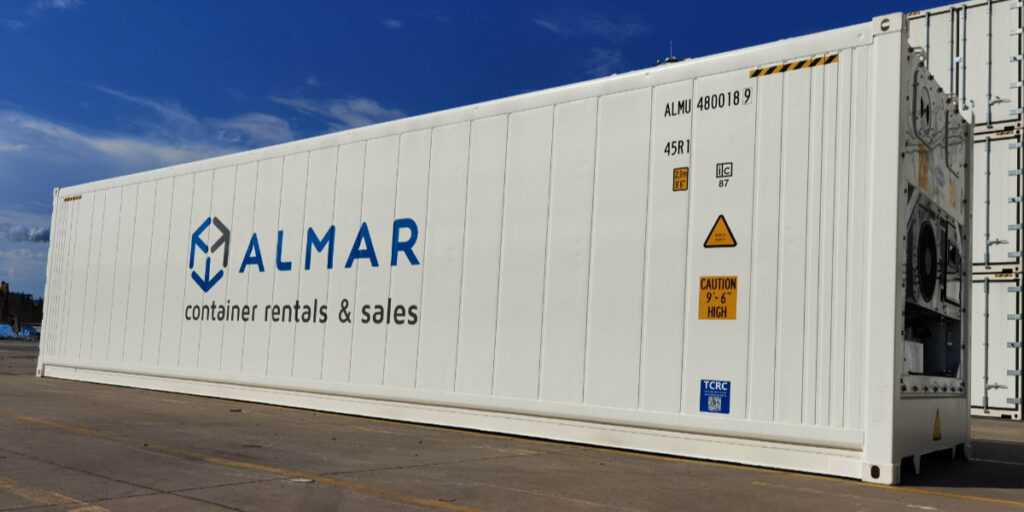
Below are a few simple guidelines that need to be followed for refrigerated container rental:
Containers are versatile and can serve various purposes. Dry shipping containers can be used for storage, transportation, offices, retail spaces, housing, events, security structures, and more. Container rental allows you to leverage their functionality for specific projects without committing to long-term ownership.
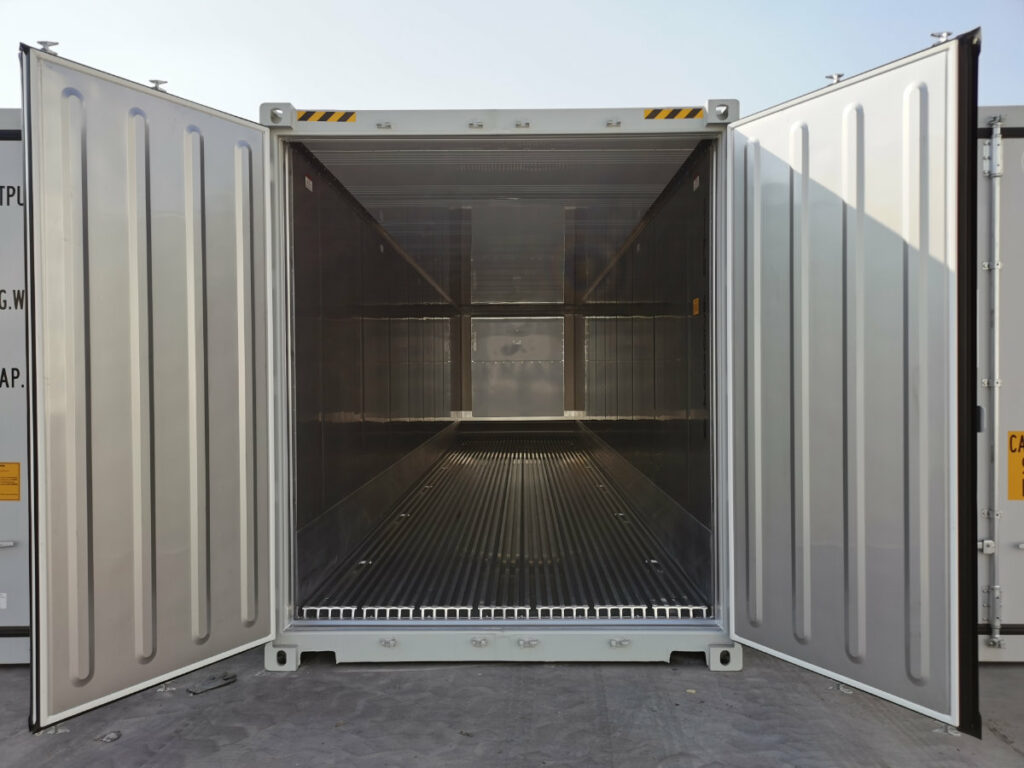
When renting a refrigerated container from Almar Kenya we implement bi-annual services which include:
If your business expands or your needs change over time, container rental allows you to easily scale up and down as required. You can adjust the number of rented containers to match your evolving requirements without being constrained by owning a fixed number of units.
Shipping containers offer a cost-effective, flexible, and convenient solution for a wide range of applications, making them the ideal choice for your business or personal use. For more information on container rental email sales.ke@almar.co.ke or phone +254 719 675 272.
Unfortunately, container fraud is rampant in East Africa and if you’re not careful you could get scammed. Here are some steps to avoid this:
For over 30 years, Almar Container Group has been providing container solutions to both international and domestic partners and continues to focus on building strong relationships based on trust, reliability, and quality as a key to our success.
Almar Kenya opened its doors in Mombasa in 2011 and in 2013, Almar broadened its Kenyan operation, opening up the East African head office in Nairobi. The operations in Nairobi extended to offer a full spectrum of services including gensets and reefer rentals as well as container conversions. For more information contact Kenya, Nairobi at sales.ke@almar.co.ke or phone at +254 719 675 272 or Kenya, Mombasa on sales.ke@almar.co.ke or phone +254 719 675 272
The Magical Kenya Open, presented by Johnnie Walker, started on Friday 19th March 2021 and Almar was delighted to be part of it. Almar Kenya was approached by Karen Country Club to assist with fabricated containers for last year’s Kenya Open golf tournament. Due to COVID, the tournament was sadly cancelled but the event organisers for this year’s event approached Almar for the same service.
Almar leased a number of converted containers to aid in the running of the event over a duration of 17 days from the 11th to the 26th March 2021. The containers supplied included nine offices for the event staff and two medical clinics used as COVID testing centres ensuring all COVID protocols were covered.
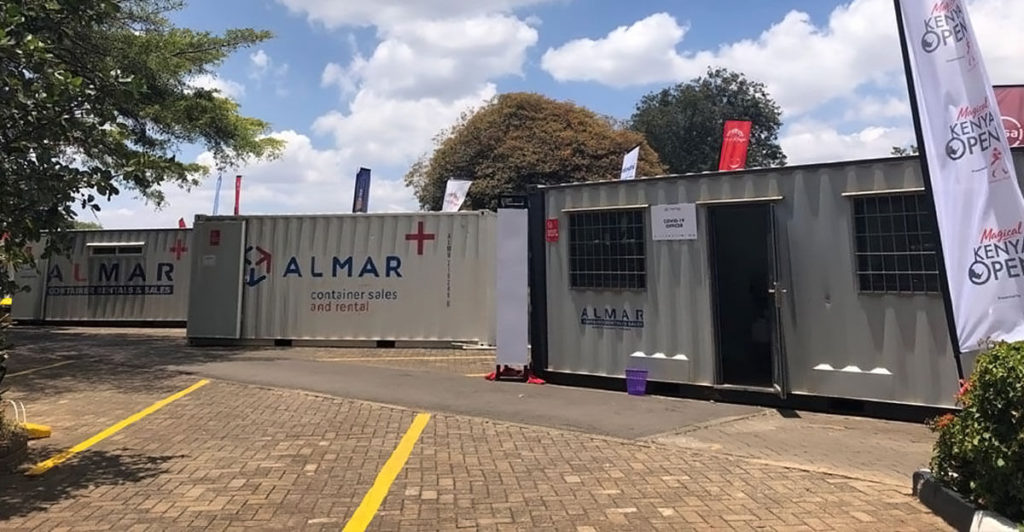
According to Lorna Onudi from Almar the lead time to deliver the units was very short. “The initial contact with the client was in February but the requirements and order were only finalised two days prior to delivery date.’’
“We mobilised the units in one day and had them all on site on 11th March. We undertook all the logistics for this short-team lease and our support staff ensured that the containers were thoroughly cleaned and in ‘tip-top’ condition for this prestigious event. As a result the customer was very happy,’’ concludes Lorna.


The benefits of container conversions / fabrications
Shipping containers are strong, secure and modular, making them the perfect solution for just about any instant space requirement. They can be modified and converted into virtually any space and their durability allows for these spaces to be moved and positioned to form individual or multiple container structures.
Not only are they suited to rapid delivery due to their modular nature, they are perfect for remote camps for everything from office and accommodation requirements to medical facilities and training rooms.
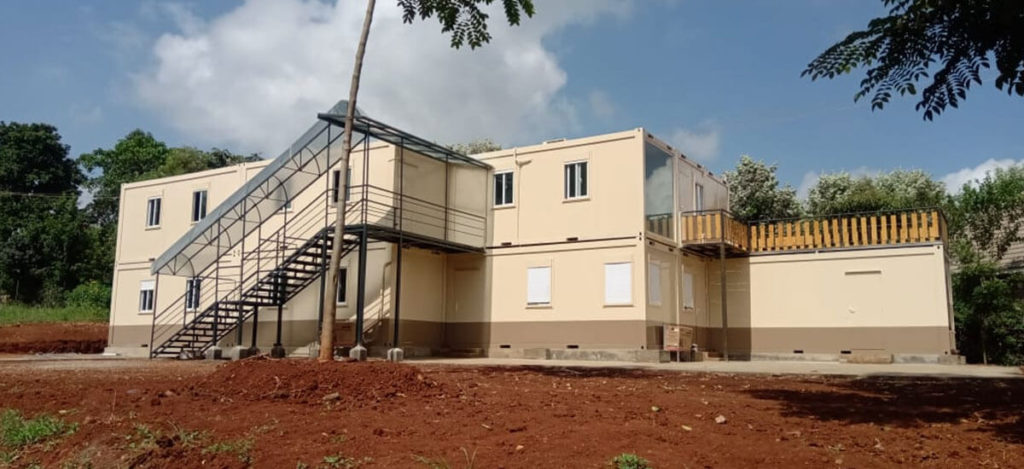


Almar Kenya built an office block for Internet Solutions (now under the Dimension Data umbrella) using flat pack containers, to cater to their corporate client who needed business recovery work stations available 24/7, 365 days of the year, in case of a major disruption to the business environment.
The container office build involved 23 flat packs stacked in two layers and included an open plan office space, reception area, meeting room, private office space, ablutions and a small kitchenette.
The Almar team in Kenya started placing containers on site to create these flat pack offices in late December 2019 and completed the build by mid-February 2020.
Great feedback from the customer was received…
“Thanks for your cooperation and we also look forward to working with you again in the future. We are speaking highly of your services in the market, and if you need to use us as a reference please don’t hesitate.”
– Richard Hechle, IS.


Reefer containers are big, mobile fridges that are used to transport and store products that need to be temperature controlled such as fruits, meat, fish, seafood, vegetables, dairy, medication and beverages, for example.
Refrigerated containers, known as reefers, keep fresh produce, perishable items, medicines, anatomical waste and beverages cold or frozen. These 20ft (6m) and 40ft (12m) containers are 2.4m wide and run on three phase (380 - 460v) power and can keep the contents at a consistent temperature ranging between -25°C and +25°C. Temperature can be adjusted and controlled to within 0.3°C of required set point.
Reefer containers are bottom air delivery units designed to distribute chilled air from the floor, via specific T-shaped decking, with the advantage of producing a consistent and uniform flow of air across the entire container, powerful enough to ensure a perfect air exchange with the goods.
Although not necessary, storing produce on pallets in reefers assists with stacking, loading and offloading. Nine pallets fit into a 20ft container while 20 pallets fit into a 40ft container.
Each container is supplied with a length of power cable between 10 and 15m long (4 core, 4mm2 cable) and a standard marine grade IP65 rated CEE 17 plug with a 3’Clock earth pin. The electrical point required is a CEE 17 coupler with 3’Clock earth with a 32A D curve circuit breaker to protect the cable / electrical components. Alternatively, remove the C17 plug completely and wire directly into a 32A ‘D’ curve circuit breaker. NB – it requires a ‘D’ curve circuit breaker or motor start breaker. An industrial light start breaker will breakdown and cause single phasing and power supply problems. Reefers require a 3 Phase plus Earth connection – no Neutral is required.
It is important to note that a reefer cannot freeze unfrozen products. Reefers are holding freezers and will maintain the products temperature. The produce needs to be at the required temperature when packed into the reefers.
Reefers are available from Almar Container Group for short and long term rental. Dependent on the location, Almar reefers are rented on a fully supported basis with 24/7 technical support. Almar can assist with technical on-site installation of the reefers should this be required and technical support contact details are placed on all our refrigerated containers should you need to get hold of a technician.
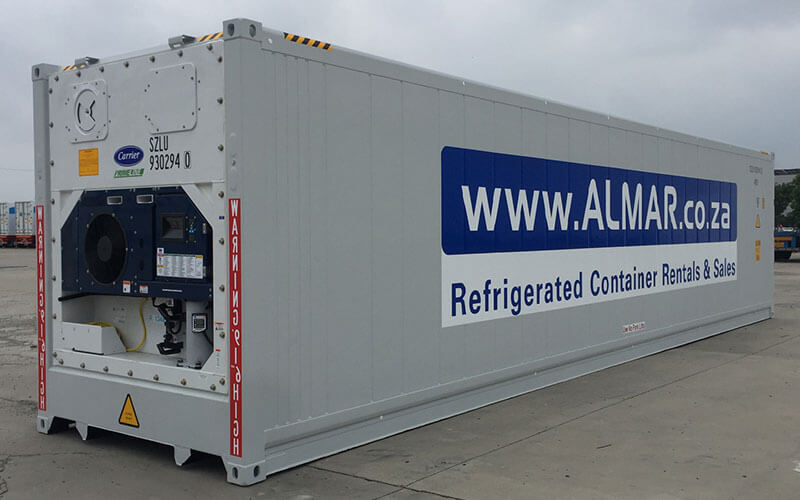
With permanent cold storage facilities you can face high costs and issues with accessibility. Chances are that your cold storage facility won’t be near the place your products need to be transported to. Hence, you’re going to end up having to organise regular transportation, which will lead to spending even more.
A reefer is also much faster to obtain than constructing bulk cold storage. With a reefer, you can have the cold storage you need immediately.
Renting a reefer container from Almar means no additional expenses such as service costs, or expensive repair costs in the event of a mechanical breakdown. Almar takes the risk and covers all these costs.
Reefers are energy efficient. All Almar containers for rent are Carrier - a world-leading brand in container refrigeration. Their optimised assembly reduces power consumption but not airflow.
For minimal environmental impact, R-134a freon of the Carrier has a significantly lower atmospheric life and GWP (Global Warming Potential) than R-404A.
| Temperature | Watts | Btu/hr |
|---|---|---|
| 2°C (35°F) | 12,000 | 40,900 |
| -18°C (0°F) | 6,600 | 22,500 |
| -29°C (-20°F) | 4,400 | 15,000 |
The site needs to be level and built from a suitable material that will prevent the container sinking into the ground. Make sure that the front and back of the unit is level and the doors are square. A slight fall towards the door end will facilitate the cleaning of the interior. This fall should be around 3 to 4 degrees.
The following basic steps can be taken to keep your refrigerated container in good working order:
Almar offers fully supported rental agreements, so we take care of the regular servicing, allowing you to focus on your core business.
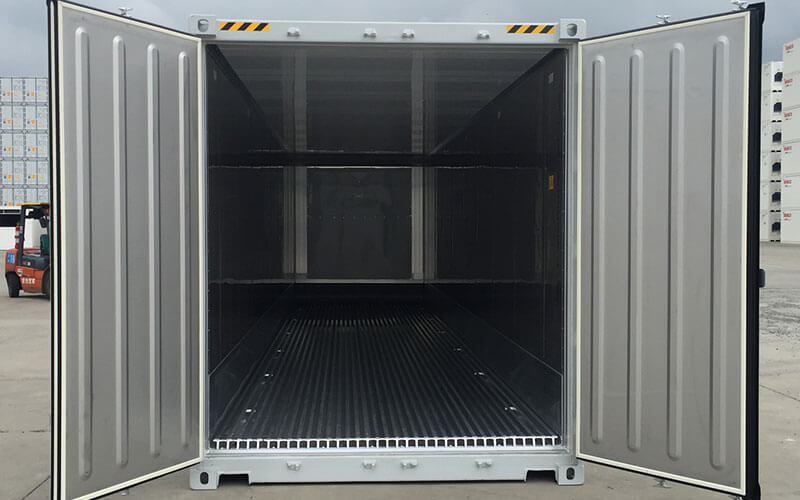
According to Dave Williams of Almar Container Group, October, November and December is referred to in the industry as ‘reefer season’. This is because retailers need to stock up on additional fresh and frozen produce and renting temporary storage on their premises is the ideal solution. Outdoor events and festivals which require temporary dry and refrigerated storage also spike over these three months.
During ‘reefer season’ in South Africa, Almar Container Group supplied reefer containers to Rocking the Daisies, The BMW M Festival, The 9 hour endurance race at Kyalami, The Nedbank Golf Challenge and Corona Sunset Festivals to name a few. This saw a 48% percentage increase in reefer rentals for this three month period.
The Nedbank Golf Challenge, one of the highlights on the South African sporting calendar, make use of reefers for the tournament which forms part of the European Tour. They rent up to 30 Almar reefers for the four day event held in November at Sun City, which attracts over 60 000 spectators. The reefers keep their stock cold, secure and at their fingertips for the duration of the tournament.
The Saudi Government organises one of the biggest entertainment events in the region called Dairiyah Seasons which runs for a month from the end of November to the end of December. The event attracts renowned global artists and entertainers with the venue extending over 130 000 square meters and attracting over one million visitors. Almar Saudi supplied a combination of 59 dry and reefer containers on a rental basis for this epic event.
Almar’s wide range of refrigerated containers provide a versatile and cost effective alternative to typical cold storage solutions. Not only do refrigerated containers offer an instant secure cold room facility, for either chilled or frozen products, but they are also offered on a rental or outright purchase basis.
Almar Reefer Containers keep your perishable goods at the perfect temperature, in any environment.
Refrigerated containers are an easy way to increase your storage volume and offer many advantages which include the following:


Eldoret Kenya
Rental of Accommodation Container Camp for Project Staff
Grupotec
Grupotec was awarded the tender to build the largest solar plant in Africa. The 100MW project is situated in a remote location in Western Kenya, requiring all construction, engineering and management staff to be accommodated on site.
With deadlines for the project being very tight it was critical for Groupotec to have their team safely and quickly accommodated on site to allow them to start construction as soon as possible.


The camp, including a mixture of accommodation units, ablutions, kitchens, dinning rooms and boardroom facilities were deployed and installed in under 4 weeks. One of the critical components for us being able to deliver so swiftly was that we were able to deploy a mixture of ex stock accommodation container and ablution container units, as well as flatpack container modules which are able to be rapidly assembled on site.
We are also very proud that our site mobilisation team assembled and installed the camp safely, with ZERO loss of hours during the project.
For more information on the Grupotec project, you can view the project details here:
Biggest Solar Plant In Africa

The recent devastation that was seen when Cyclone Idai hit the coast of Mozambique and took that momentum all the way into Malawi and Zimbabwe leaving a trail of destruction was well covered by the media. As so often happens, the hysteria and panic attract large scale interest, but when it’s not close to home, the interest dies off very rapidly from both a media and practical support perspective.
The real challenge, however, is that the actual implications on the ground seem to often work the other way around. There is no doubt that the devastation caused by the event was widespread and extremely destructive, however, the consequences on the ground now continue to get worse for those left behind.
Many of the worst-hit regions are rural areas, densely populated with subsistence farmers who have lost their livelihoods. With much of the infrastructure wiped away, it has become impossible for them to get access to food and fresh water and the situation becomes more desperate with each passing day.
As a company without a footprint in Mozambique, it is difficult for us to assist practically. However, we are doing what we can and are trying to support those who are making a difference with practical support on the ground. We have donated 3 containers to date for the distribution of food and basic supplies and have donated $2,000 for clean up operations being carried out by the below two companies.
The company names have links to their support operations and we would like to implore you to have a look at what they are doing on the ground and support them in their efforts. Thank you to J&J Transport and LBH Mozambique for your efforts in improving the lives of those affected by Cyclone Idai.
Strictly speaking, a container is anything we put things in for safekeeping or to deliver them somewhere. Theoretically, a ‘container’ could be a corrugated or cardboard box, a crate, or even a drum. However, over the years the transport industry developed a large, robust cargo container ‘box’ with doors, and adapted the design so it could travel by ship, rail, or on a lowbed trailer.
The terms are virtually interchangeable since a cargo container can transport by ship, rail, or lowbed trailer mode. This flexibility enabled container shipping to simplify loading and unloading and dominate the cargo industry.
It also spawned a vibrant market in second-hand containers beyond their use-by dates but still in fair condition. These cargo containers are in popular use as construction site offices, village clinics, holiday homes and so much more. Our customers love them because they are cheaper than brick-and-mortar buildings, and ‘erect’ in a flash.



The cargo container has proved its worth as a quick and convenient way to move goods around the world. Handling and securing equipment on ships, railway trucks, and lowbed transporters have standardised too. A container sent from Durban to London will hold no surprises for dockworkers on the far side of the world.
Those over 20 million containers make a total of 200 million trips every year. At any one time, there are close to six million of them travelling on ships to the four corners of the globe. An average of four of them falls into the water every day, which is remarkably low compared to the number of traffic accidents in Durban!
A number of these containers never make it back to their owners because of the high cost of shipping them empty. There are currently several million of these for sale in cities with container ports, and these are increasingly being turned into economic homes and affordable student housing.
The people who conceived the first cargo container would have had no idea how it would transform commercial transport. Indeed its influence compares with the extent the internet transformed communication.
Almar has a stock of containers for sale or for rent in Durban, Walvis Bay, Dubai, Dar es Salaam, Kabar, Mombasa, Kampala, and Nairobi. Please be assured of our best prices and contact us soon for superior service.
We get calls every week from people wanting to know the optimum shipping container sizes for their household goods. Sometimes they end up purchasing a used container from us in cargo worthy condition they can resell at their destination. However, others prefer to use a removal company because they have enough on their minds.
Most of the containers we see on ocean-going ships (and occasionally falling off) are either 20 ft. or 40 ft. ones. However, there are other smaller and larger ones in the below list:



The most popular shipping container sizes for household moving are 20 ft. and 40 ft. ones. As a general rule of thumb:
However, it’s rare to find a family needing exactly 30 or 65 cubic metres. Hence many people relocating share containers with others moving to the same location.
Your shipping agent will help you calculate the optimum size. You may find leaving the leather lounge suite behind achieves a greater saving than the cost of a replacement one overseas.
If you pay for a ‘full container load’ (FCL) you don’t have to ‘stand in a queue’ while your household goods travel somewhere else first. However, a ‘less container load’ (LCL) can work out cheaper if you don’t mind waiting a little longer.
Shipping household goods from Durban to the UK can cost between R100,000 and R150,000 depending on container size, insurance costs, final destination etc. Cape Town to Sydney can cost between R150,000 and R200,000. You could have more money in your pocket towards setting up your new home by making the right decision when choosing between shipping container sizes wisely.